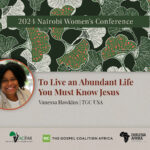Greetings
It’s good to see you. It’s so good to be here I am just thrilled. Courtney and I are still pinching ourselves that we get to be in this space with you ladies. I want to say guys, because, you know, that’s that St Louis in me. It’s just such a pleasure, such a thrill to be here.
I do bring you greetings from New York City, Redeemer Lincoln Square. And, just glad to be present with you. What the Keller Center is, to answer Colette, it is a branch of the Gospel Coalition and the namesake is Tim Keller. And it’s just committing to partner with the church, the local church as well, to teach cultural apologetics – that means being able to communicate the gospel in a way with gentleness and with respect and to try to encourage people into the church. But also to close the back door of people leaving the church, to make apologetic relevant to um this generation and this um cultural moment.
So that’s a little bit about what we do. We do that through writings and through teaching cohorts and through the fellow through the work of each of the fellows in their respective fields. So that’s a little bit about that. But that’s not really why I’m here.
Did you guys have good sessions? Well my people weren’t acting right in my session and I just want to say that from up here. They kept trying to bait me and make me talk about stuff that was not on my agenda, you know. And I told them I came to talk about Old Testament narrative. Didn’t I tell you guys that up front? I told you that and they were like well then but what about proverbs and then what about – just asking all kind of stuff – just had me all over the place but we had a good time we had a good time. We didn’t have enough time but we had a good time. and I trust that you had a good time in your group as well.
John 10
All right, well we’re going to talk about the “I am” statement of Jesus – I am the door. That’s found in John 10. And anytime Jesus is speaking and he says that “I am” our ears should perk up because whoever he’s telling us that he is, man, that’s who we want to know. That’s who we want to believe that he is. That’s what we need to know about him. And so when the Lord is revealing himself to us, man, we want to pay attention.
And so, he’s saying in John 10:1-10, which we will read, “I am the door.” I’m reading from ESV. Please read along in whatever version you have.
“Truly, truly, I say to you, he who does not enter the sheepfold by the door but climbs in by another way, that man is a thief and a robber. But he who enters by the door is the shepherd of the sheep. To him the gatekeeper opens. The sheep hear his voice, and he calls his own sheep by name and leads them out. When he has brought out all his own, he goes before them, and the sheep follow him, for they know his voice. A stranger they will not follow, but they will flee from him, for they do not know the voice of strangers.” This figure of speech Jesus used with them, but they did not understand what he was saying to them.
So Jesus again said to them, “Truly, truly, I say to you, I am the door of the sheep. All who came before me are thieves and robbers, but the sheep did not listen to them. I am the door. If anyone enters by me, he will be saved and will go in and out and find pasture. The thief comes only to steal and kill and destroy. I came that they may have life and have it abundantly. (John 10:1-10)
Let’s pray. Gracious God, thank you for the truth of your word. And so Father, we wouldn’t dare come before your word and not ask you to be with us, and not ask you to prepare our hearts to receive the truth of your word. Would you do that Lord, in the hearers, Lord would you do that in the teacher. Lord, would you edify your people, would you glorify your own great name. Would you give us understanding and clarity? Would you show us who you are that we might love you more and that we might worship you more fully. In Jesus name, amen.
So in these 10 short verses – yeah me being still is a problem generally, guys. Let’s see. In these 10 short verses, Jesus describes himself as both the door of the sheep and the Shepherd of the sheep. But in our time together, we’re going to focus on the I am statement of “I am the door” and what he means by calling himself the door.
Now if the Bible is unfamiliar to you, starting with this this declaration that “I am the door” might seem a bit strange and it would as if you were starting in the middle of any story. So, to that end, we’re going to travel back a bit to the beginning of the story so that together we can sink our teeth into the truth of this text and hear this good news of why Jesus is the door, why that is good news. Okay?
Alright, but to get us there, I’m going to talk to you about the day the door closed, looking for access another way and Jesus as the door, okay. So for those of you who are note-takers: the day the door closed, looking for access another way and Jesus as the door.
The Day The Door Closed
Now in preparing for our time together, I thought a lot about my dad. And as a little girl, I just wanted to follow him everywhere. I just wanted to be everywhere that he was. I wanted to do what I saw him doing and anywhere that he was doing it. If it was riding in his old 1963 pickup truck, if it was getting our hands dirty in the garden, occasionally shooting his gun with them in the woods. As you may have guessed, I was not a prissy girl. I was kind of rough and tumble, y’all. I was that barefoot, rock-throwing, tree-climbing, mud pie-making, kind of garden variety Daddy’s girl – that was me.
And dad would take me to school in his pickup truck and when I got home at the end of the day, I would sit on his lap every day, this was my routine, and I’d tell him all the mundane details of my day. And I would tell them how Chuck wore his Superman t-shirt that day, cause that’s important. And then I would tell them how I had to teach Miss Joyce, my teacher, how to dance. and then I would tell them, you know, Renee wouldn’t even let anybody share her crayon. I mean, I would tell him all the scandalous kindergarten news, you know? And he would listen to all of it. He would listen to the last detail with the same enthusiasm he listened to the first detail.
And so I thought what I was saying was really important because it was to him. It mattered to him and there was just this sense of welcome that I felt with him. It was pure delight. I knew that he delighted in me and he never hesitated to receive me or let me come close to him because my feet were too dirty – they probably were – or because I was wearing bits of my lunch and parts of the playground on my clothes. He would still pull me close. He was always glad to see me, always glad to be near me, rejoicing in all the details of my day.
And I just knew in those moments I was completely loved and completely delighted in.
And it’s the picture that my mind goes back to when I think about the relationship that the Lord desires to have with his daughters. That’s the relationship he desires for us. And it was the relationship of our first parents, Adam and Eve. And on countless days, they had enjoyed sweet conversations with the Father, up close and personal. They had run to him to tell him all that they were seeing and doing in the garden, every delightful detail. He knew Eve’s favorite flower power. He knew Adam’s favorite views of the garden. They were naked before him, physically and emotionally, and not ashamed. He knew them, they knew him. It was a beautiful intimacy.
And then, until one day, we hear the voice of God walking through the garden in the cool of the day, Genesis 3 tells us. Yet, they don’t run to meet him as they had in times past. Instead, they hide and we hear the heart of God breaking as he calls out, “Adam, where are you?”
It’s always fascinating to me when God asks a question, being all wisdom, knowledge and understanding, when God asks a question, we know it’s not for him – it’s for us.
I can remember being home with our three girls. My husband and I have three daughters. They are now not so little. They are 24, 22 and 20. I still have to say it just to make my heart believe it. So you guys are part of my therapy today – thank you! 24, 22 and 20, yes, I can do this.
And when I was home with them in their early years, they would be playing in another room and everything was fine as long as I heard stuff banging, I heard joyful screaming and I heard sometimes not so joyful screaming, but it was, you know, I knew everything was okay. But it was when things got quiet that I got concerned. You know that quiet that’s too quiet? And so I would say, “Hey, what are y’all doing in there?” And depending on where they were in the house, I kind of knew what brand of mischief that they were into.
But I would ask the question so that they would assess what they were doing, right? And hopefully stop. That was, you know, that was the idea. When God asked the question, “Adam, where are you?” In essence, he’s saying, “Consider where you are. You’re not where you’re supposed to be. You’re not where I put you to be, up close and personal to me. This isn’t what I’ve created you for. You’re not in the place of intimacy that we once enjoyed. You’ve done what you’ve been commanded not to do – eaten from the Tree of the Knowledge of Good and Evil – and now you’ve traded my joyful presence for shameful hiding. Adam, where are you?”
In giving Adam and Eve the boundaries for flourishing in the garden, he told them the day that they ate of the Tree of the Knowledge of Good and Evil was the day that they would surely die. And being a God that cannot lie, Adam and Eve’s rebellion ushered death into the entire world for all humanity, including you and me. Yet the Father, knowing that a fig tree and a fig leaf wasn’t sufficient to cover their shame, he shed the blood of an animal and covered their nakedness.
And it was right then that he had promised to send a remedy, that Genesis 3:15 promise that we heard about this morning; someone who would crush the head of the enemy who had deceived them. The coming savior would crush this enemy’s head and the enemy would bruise his heel. The Father promised that the coming savior would set right all that had been broken. And in his kindness and in his severe mercy, he put Adam and Eve out of the garden and put angels with flaming swords that kept them from coming back into the garden. Because to come back in would be to be trapped in a state of death forever and in his mercies he didn’t allow that. So, for their protection, he put them out. That’s the day that the door closed.
Looking For Access Another Way
So now how do we know that this Jesus who shows up on the pages of our text is the one the Father had promised? The Apostle John tells us from the very beginning of the Gospel in chapter 1:10 that this God man, Jesus, was in the world and the world was made through him yet the world did not know him. The Pharisees, these Jewish teachers of the law, followed him from place to place opposing his teaching and asking if he’s the one that the Father promised, the one they’ve read about in the Scriptures.
Jesus, being the master communicator that he was, gives them a parable, a figure of speech in the language of their world. Those in his audience likely would have had at least a sheep or two so he talks about, what else, sheep and sheepfolds to communicate a deeper truth. Jesus says in verse 1, “Truly, truly I say to you, he who does not enter the sheepfold by the door but comes in by another way, that man is a thief and a robber.” (John 10:1)
Now those listening would have been all too familiar with sheep and sheepfolds. He’s speaking a language they understand. They would have understood that a sheepfold is just a sheep pen that has only one entrance. And so but, what was less clear and perhaps maybe even a little offensive is; exactly who is Jesus calling a thief and a robber?
He says that, doesn’t he? He says, “He who does not enter the sheepfold by the door but climbs in another way, that man is a thief and a robber.” (John 10:1) And when they didn’t understand that, he says to them again in verse 7, “I am the door of the sheep and all who came before me are thieves and robbers.” (John 10:7)
He doubled down on it! And so if you’re like me you’re saying, “Is Jesus intentionally trying to offend these people? Surely there were faithful teachers of the law who came before him, surely? Why is he saying this harsh thing?” And well, consider who’s in his audience; those following him around and opposing the truth of the very gospel and suggesting that there’s another way to the Father. He says of those who search for another way outside the truth of the Gospel that he proclaimed – that man, that woman, that boy, that girl is a thief, is a robber.
So then why is he making this distinction between thief and robber? Well, the goals are similar, right? They are trying to separate you from your stuff, right? Thieves and robbers do the same thing in that sense. But thieves are more covert, more subtle, a little sly and cunning in their acts, while robbers tend to be a little more blatant, bold in their deeds and it might even include some violence, right?
So when Jesus enters the temple, then, in Matthew 21 and he found the money changers and people selling animals, what did he call them? A den of robbers. He made a whip of cords, drove them all out of the temple with their animals, poured out money changers coins, turned over the tables – he was furious. Why? Because he said to them; “It is written, ‘My house will be called a house of prayer’ and you are making it a den of robbers.” (Matthew 21:13)
You know, through the years, I’ve looked at this passage again and again and again and I’ve always thought that it’s about the irreverence and the disrespect for God’s house. And it is, but it’s about a lot more than that. It wasn’t inherently wrong to be a money changer or to sell animals, that was kind of necessary because the people needed to make sacrifices, and so, that was necessary. But what was wrong was their heart posture and their priorities. What Jesus was accusing them of stealing was far more precious than money. He was accusing them of stealing other people’s access to the Father.
And so, the outer courts was the only place in the temple that was open to all people, including non-Jewish persons and women and foreigners. So that’s the significance of Jesus saying that his Father’s house was to be a house of prayer for all nations, including non-Jewish people and immigrants.
And so the money changers setting up shop in the outer courts was akin to setting up a convenience store for those who had the privilege of going in further into the courts, the inner courts. They were disrupting the worship of those who had limited access and Jesus just wasn’t having it. Yes, he was livid at their irreverence, but also at their bold injustice: the robbery of those being denied access to worship and pray to his Father in his Father’s house.
And so, when he says this house is to be a house of prayer for all nations, it means for the people we think it doesn’t mean, for the people that we think deserve to be accommodated, that’s what he’s saying. It’s not the people that we prefer or the ones that increase us the most but for all nations, all people groups. It means we don’t get to exclude who he’s included. We don’t get to disinvite who he has invited. It means we don’t get to put practices in place that discourage any people group from coming into the Lord’s House.
He says, “My house is to be a house of prayer for all nations; yet you have turned it into a den of robbers.” (Matthew 21:13)
You know, the moment that we communicate to people that they need Jesus and something else to be a part of God’s family is the moment that we become the thieves and the robbers. The money changers of that day didn’t care about the sheep, they didn’t care about the worshippers who were in the outer courts. Their system boldly disadvantaged the vulnerable for the benefit of the most influential. Jesus called them a den of robbers; bold in their theft of worship for those on the lower rungs of society who came to pray and worship God.
He says, “All who came before me were thieves and robbers,” (John 10:8) and then to put a finer point on it, in verse 10 he says, “The thief comes only to steal and kill and to destroy.” (John 10:10) And the kind of thief he’s talking about isn’t petty thief, it’s not petty theft, it’s not a victimless crime but it robs the sheep – the very people of God – of worship, of flourishing that they were created for. Jesus says the thief’s purpose is to steal, kill and destroy.
Now, it’s really easy to consider the conning thievery that happened in the garden; Satan deceiving Eve, twisting God’s words, robbing them of their contentment, ushering spiritual death into the world, destroying their intimate relationship with the Father.
But what is perhaps harder to see is that there is still a very real and present enemy who exists to steal, kill and to destroy. And I know that some get uncomfortable talking about the devil, but I want to suggest to you that part of our problem is that many of us don’t know we’re in a fight. We have a real enemy who is actively seeking to steal, kill and to destroy all that is good and holy in our lives and we’re afraid to call it what it is.
We are constantly being discipled into the image of the gods of our culture. We take in so many false cultural narratives in the run of a day that directly contradict the gospel and rob us of the truth and flourishing that God created his women to have.
My husband and I have three daughters and no sons. Boy dog – that doesn’t count! And yet, the Lord has given us so many sons in our community. I was recently talking to this young man about his dating relationship – they tell me all the things, guys, they tell me all the things. And we were talking about his dating relationship and I was encouraging him to seek to be a genuine friend to this young lady that he was interested in, right? And so I told him to get to know her as any good relationship would need at least that, right?
And so he was honest and letting me know well, “Don’t nobody do that anymore.” I’m like, “Beg your pardon?” And he’s like, “Well, dating is about being open to anything and sex doesn’t need to be complicated by love and commitment and all that old school stuff,” he said to me. And so after listening for a while I told him, “Son, everything new ain’t improved. The word of God is still truth, no matter how learned and enlightened we think we’ve become.”
And what he was really telling me was that he had found another way to the good life, right? And for him, that way was sexual freedom. It’s about using your body to do what feels good to you and it falsely assumes that real freedom is found in our own autonomy- being able to do whatever we want to do with these bodies.
But can I tell you that no created being has unlimited freedom: we’re all bound by something. And while we have the freedom to choose our actions, we’re bound by the consequences of the choice.
For him, the so-called sexual freedom that sounds like good life to him, was the potential to have unwanted pregnancies, unwanted disease, sexual addiction, shallow relationships, emptiness, loneliness, on and on and on. And what seems like the way to the good life is really a lie whispered in the culture by a master thief.
And it’s not the only lie he’s telling. I’ll bet he’s whispering something to you too. And we are most vulnerable to these lies in the places of our greatest discontentment. So, it’s reasonable to ask ourselves; where are those places, where might those places be for us? Where are the places of endless striving where it seems you can never be satisfied? Where is that? Where is your place of greatest struggle and greatest discontentment?
These are the places where we are most likely to look for another way to happiness, the places of deep longing where we’re convinced that if we just had, and you fill in the blank, we would be happy.
For some, it’s more stuff or maybe to turn back the signs of aging – that would be nice, right? That’s the way to contentment. Or for some, it’s just needing maybe just a little more education. One more certificate or degree and then I’ll be worthy. For some, it’s endlessly seeking for love and approval – often in all the wrong places. For some, it’s the pursuit of money, financial security that has eluded us. And on and on it goes.
And none of these are wrong. They’re not bad goals. It’s just when these desires for things become our ultimate goals, they become all consuming and they go from being good things to ultimate things. That’s when we turn the corner into idolatry; inordinate desire for something other than God.
And underneath every act of idolatry is a fundamental disbelief of the Gospel. Or, in other words, a belief that there is another way to the abundant life. Idols thrive where we are not yet convinced that we can never be good enough, pretty enough, smart enough, rich enough to find lasting satisfaction.
We look for other ways to the abundant life and and all the other ways are thieves and robbers that enslave us, they fool us into thinking and looking for satisfaction that we can… looking for satisfaction and things that can never satisfy us, that are empty. They keep us distracted and striving, restless, wasting our time and our energy, surrendering our peace – always promising what they can never deliver. Thieves and robbers I tell you.
It’s worth asking; what’s been robbing you? What are you putting an inordinate amount of time and resources into and yet never finding satisfaction? It’s essential that we identify these thieves and robbers and arrest them with the truth of the Gospel. We can’t let them roam free in our lives, live rent free in our heads.
The enemy whispers lies on repeat in our lives telling us we’re not smart enough, we’re not pretty enough, we’ll never be good enough, we’ll never be thin enough, we’re not rich enough. Who do we think we are? In a million other ways that we don’t measure up and we’re trying to measure up to some poor, unsuspecting woman who has just as many issues as we do.
It’s the truth!
We can only combat those lies by preaching the Gospel to our own hearts, over and over and over again. And instead of being imprisoned by the lies of the enemy, we have to continue to speak the truth that sets the captives free. But in order to do that, we have to be so Scripture-saturated that we can quickly recognize a lie, we can quickly recognize what’s not true, challenge it with the truth of the Gospel. That’s how you arrest a thief.
Jesus Is The Door
Now Jesus says it’s the thief who comes to steal, kill and to destroy. Jesus draws a stark contrast between what the thief comes to do and what he comes to do. The thief comes to steal, kill, to destroy. I come that they might have life and have it more abundantly, to the full, to the brim, to the seams, overflowing.
He says in verse 9 that “those who enter through the door and go in and out and find good pasture.” (John 10:9) And as good students of the Torah, the Hebrew Bible, the Pharisees would have known that when Jesus said this they would “go in and out and find good pasture,” he was using covenant language. Courtney talked to us about covenants this morning, that’s covenant language. He was referring to the promises that God consistently made to Israel throughout the Old Testament that he would be their people, they would be his people and he would be their God. And if they indeed kept his commandments and lived lives of obedience to his word, then blessings would chase them down and overtake them.
I like the sound of that, don’t you? These are the covenant blessings that he’s echoing from Deuteronomy 28:6. He refers to, he says this, he says, “You will be blessed in the city and blessed in the country. The fruit of your womb will be blessed, and the crops of your land and the young of your livestock—the calves of your herds and the lambs of your flocks. Your basket and your kneading trough will be blessed. You will be blessed when you come in and blessed when you go out.” Deuteronomy 28:3-6
The condition of all those promises was if they indeed kept his commandments and lives of obedience to his Word, then blessings would chase them down.
Now Jesus is the blessing who has chased them down for 42 generations since the Father promised a savior. And he’s saying to them that the promised life of blessing you’ve been longing for is only through me. It will never come through your efforts of trying to be good enough or trying to earn your way back to the Father. It’s only through me that you find good pasture, that you find abundant life.
So when he says that they can have life abundantly, what does he mean?
You’ll have to tell me if this is true in Kenya, but in our culture, we tend to think of abundance as stuff, as possessions. And while many of the covenant blessings we just considered are about material things, they are so much more than that. The covenant blessings concern the total well-being, the “shalom” of God’s people. Not just their stuff, but all of life – this life and the life to come.
And so it is said of Jesus in John 1:16 that it’s from his fullness, his abundance that we receive grace upon grace. And when Jesus has in abundance, what he has in abundance is grace – undeserved kindness, that he pours out on us again and again, to the undeserving, to the inadequate, to the imperfect, you and me. And sometimes our places of greatest abundance are our places of greatest failure because they are the places where the reality of God’s grace sinks down into our lives the deepest. These are the places in our lives where we are convinced that we can do nothing to earn the Lord’s kindness, that we really don’t deserve it and that his grace really is a generous and a very kind and good gift.
An abundant life, then, isn’t a perfect life but it’s one where each failure magnifies our need for a savior – that’s abundant living. And growing in the reality of our need for that grace really is the key to abundant living because it frees us from the pressures of perfection and performance, and it allows us to just be beloved children who need their Father.
Now I will say that sometimes we do such a good job of telling people that the Lord is full of grace, and convince them that they can never earn their way to God, that is true, but sometimes I think we forget to tell them that there is yet a blessing in obedience. Both are true. Living lives of obedience is to believe that the one who created us is the one best suited to tell us how we should live.
We are not called to perfection, we’re called to faithfulness. And that involves living lives of obedience. And so this life of obedience begins with receiving an invitation to come through the door. Jesus says in verse 9, “I am the door and if anyone enters by me, he will be saved.” (John 10:9)
And so now we know that one of the uses of a door is protection. When you come in the house at night and close the door, that’s so that the stuff out there can stay out and you can stay in. The people in can be safe. It’s to keep out danger and to ensure the safety of those who are inside.
And those listening to Jesus would have known that some sheep pens are simply sides of caves or just piles of rocks without any kind of a formal door so the shepherd would lay himself, would stretch himself across the opening of the cave or of the makeshift pen and would himself act as the door. The door to the sheep pen kept the sheep in an enclosed space. It kept the wolves out and others who would harm them.
The shepherd acting as a door was a declaration to every wolf, every thief, every stranger, every robber; “If you want to get to these sheep, you first got to come through me.”
And so, we get some sense of how this works from David’s conversation with Saul about tending to his father’s sheep in 1st Samuel 17:34-36. David says this to Saul. He says, “Your servant was tending his father’s sheep and when a lion or a bear came and took a sheep from the flock, I went after it, attacked it, rescued the sheep from its mouth, and when it rose up against me, I grabbed it by its mane, struck it and killed it. Your servant has killed both the lion and the bear.” (1 Samuel 17:34-36)
Don’t mess with my sheep. That’s the message. If you missed the subtext, that’s what it was: don’t mess with my sheep. Jesus declaring himself as the door was a declaration that those in his care would be protected by him and saved by him, even if it cost him his life.
And it did. He fought death, our greatest enemy, the enemy that entered the world through that beautiful garden. And much like the shepherd who stretched his body across the opening of the sheep pen, Jesus stretched out his body on a cross between heaven and earth. And as a declaration to death that, “to get to my sheep, you first got to come through me.”
Sinful men beat him, ripped his flesh, brought him face to face with our mortal enemy – death. Death swallowed up his humanity but couldn’t digest his divinity because in three days, he rose again from the dead. He had stripped death of all of its power and made a spectacle of death. It no longer had power over Jesus.
And guess what? It no longer has power over us.
How do we know this? John tells us. John 5:28. He says this, “For an hour is coming when all who are in the tombs will hear his voice and come out.” That means there’s a day coming when Jesus calls, that means everybody’s got to get up.
Now some will rise to eternal life, some will rise to eternal judgment, but when he calls, everybody’s got to get up. That’s how bad Jesus messed up death. He says, “I am the door and if anyone enters by me, he will be saved.”
Children Of God
The Apostle John tells us how this is possible. He says Jesus was in the world. The world was made through him yet the world did not know him. But he says this, the good news comes after the but, “to all who did receive him and believed in his name he gave the right to become children of God.” (John 1:12)
If you believe that Jesus is the one that the Father promised, the one who came that we might have life to the full, the one who lived a life perfect, died in our place, defeated our greatest enemy – death, then that means you believe on his name and right in this very moment, you can receive him in the quiet of your own heart, you can go to the Father now and tell him that you’re coming to him through his son, Jesus because Jesus said I could come because he’s the door.
And having the right to become children of God, you never again have to look for another way. Jesus is the way. You don’t need to climb over a wall or through a window. You don’t have to worry that your feet are too dirty or about the shameful bits of life that you’re wearing. You’ve been given the right to walk in through the door, go into the Father’s presence and tell him every detail of your life: all your joys and all your sorrows, knowing that he will hear you and receive you with delight.
Having the right to become children of God means you have bold access through Jesus the door; not outer court access, not second class access, but bold access, child of God access, daughter of the king access. You can come in through the door with all your faults and all your failures, all your disappointments, all your regrets, all your guilt and all your shame and know that the Father looks at you with pure joy and pure delight.
His Son took all the guilt and shame so you never have to wear it again. You never have to look for another way to the Father. You can just walk in through the door. “To all who receive him and believe in his name, he gave the right to become children of God.” (John 1:12)
If anyone enters by him, they will be saved. Come on in through the door. Jesus is the door.
Let’s pray; Gracious Father, we thank you that there is no better way than Jesus. We thank you for abundant life in Jesus. We thank you that there is a way that has been made back to you, through Jesus’ death. We thank you for his defeating death and the grave. We thank you, God, for his rising after three days in the grave. We thank you for his triumphing over the grave. Because he got up, we will too.
And so we praise you for that. So Lord, we come, laying every bit of guilt and every bit of shame. We come laying all of the things that Jesus died for and saying “this doesn’t belong to us anymore,” because Jesus has opened the door back to you. So Lord, we thank you for access back into your presence through Jesus. We give you praise for that. And so, Lord, now we ask that you would continue to draw us closer to yourself, cause us to know you better, cause us to see you with greater clarity, cause us to worship you more fully and more deeply, until your Son returns again and we shall be just like him. In Jesus name, amen.














